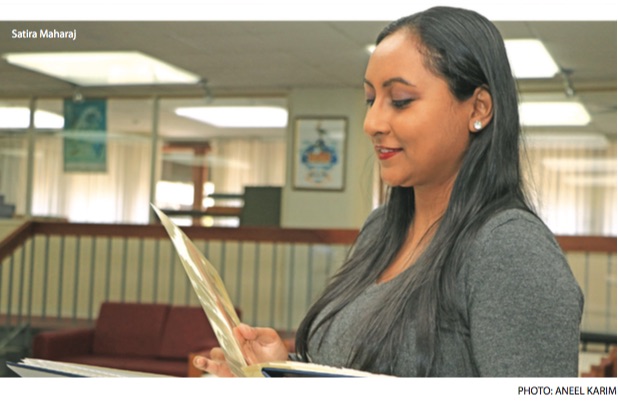I used to think of history as objective truth – straightforward facts that told a story. As a gender studies student, I learned that knowledge does not simply come to exist. It is constructed within specific contexts (historical, cultural, political and economic), sometimes with particular agendas in mind. Dominant narratives become difficult to question.

Intrigued by the materials at UWI St Augustine’s West Indiana and Special Collections (WISC) Division within the Alma Jordan Library, I wanted to question the underlying assumptions about gender in our historical archives, attending to how knowledge is not just uncovered, but created. West Indiana houses a general section, rare books, and Special Collections. The Special Collections are what drew me to this division. They contain manuscripts, personal papers, letters and organisational documents that offer fascinating opportunities for examining how we construct history.
As part of my MSc programme at the Institute of Gender and Development Studies (IGDS), I undertook an internship at WISC. I worked with a collection of Caribbean First Day Covers, which are commemorative envelopes issued by official postal authorities. These envelopes usually contain specially designed stamps for the event being celebrated. This collection became an archive for my research.
Could each cover be useful for research on gender? I recorded information about relevant covers, such as postmark date, the event it commemorated, the number of stamps, a short description of each stamp and the monetary value of the stamp. This will be uploaded to the Special Collections database by the WISC staff, so that future researchers have access to the information.
My findings covered six themes. The first was the Invisibility of Women in Building the Caribbean. The covers celebrated many men who contributed to building the Caribbean nations, but few women.
The second theme examined the Underrepresentation of Women in Sport. I looked at unequal power relations that led to the extreme visibility of men’s sports like cricket and football, but did not similarly celebrate women’s participation in sports like netball and cricket.
The third theme looked at Women’s Organisations, such as the Soroptomists Clubs and Girl Guides. Their valuable work is often framed as volunteerism, service and care work, or “women’s work”. It was not seen as important as the “nation-building” activities for which men are celebrated.
The fourth theme, Representations of Women in Art, showed the colonial male gaze through which women are often depicted in artistic stamps. The fifth theme involved Christmas and the Sacred Feminine. Through Christmas stamps, I examined the role of the Virgin Mary figure and religious influences in contributing to Christmas as an idealised, domesticised, nationalistic but syncretic festival. The final focus, on Caribbean Women Artists, catalogued stamps which featured the art of women artists, like Weme Caster, Paula Walden, Eva Wilkin and Sybil Atteck. These artists told women’s stories from the perspective of women.
Overall, my internship experience was wonderful. WISC is a library within a library, since many general library functions are carried out on a smaller scale. Staff members facilitate and assist university students, independent researchers and visiting scholars. The staff showed me their ongoing projects. One was working on the JD Sellier Collection, which was acquired from an old, prestigious law firm. Another was documenting a series of taped interviews. All these materials are available for further exploration.
This internship reminded me why I love libraries. It contributed to my academic development, and enabled me to document how stories can come to appear as historical, gendered truths. Next, I will be sharing my findings through an online lecture. Look out for further information on the Alma Jordan Library Facebook page.